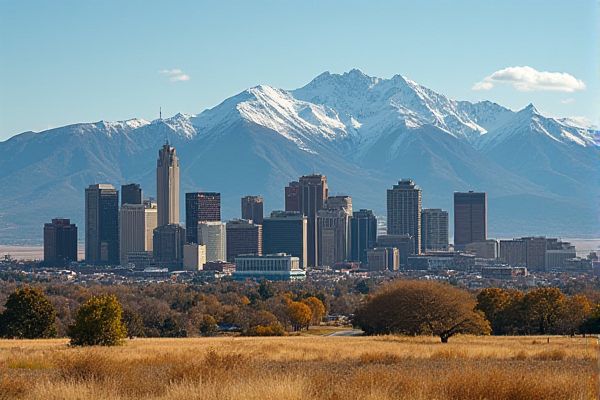
Moving to Colorado checklist: Research Colorado's cost of living. Understand Colorado's diverse climate. Explore housing options early. Register your vehicle in Colorado. Familiarize with local wildlife precautions. Adjust to high altitude living. Discover outdoor recreational opportunities. Learn about state income tax. Transfer driver's license promptly. Join community groups and events.
Research Colorado's cost of living.
The cost of living in Colorado is 6% higher than the national average, primarily due to housing costs that are 20% above the average, despite utilities being 9% lower. Other expenses, such as food, healthcare, and goods & services, are slightly higher as well. For individuals, average monthly living expenses amount to $2,066, while a family of four averages $3,726 per month. It's important to note that these costs can significantly vary depending on the specific city and location within the state. For a detailed breakdown, visit the Cost of Living Calculator to better understand how expenses can differ across Colorado.
Understand Colorado's diverse climate.
Colorado features a diverse range of climate zones, including semi-arid steppe, humid continental, and alpine climates, with varying temperature and precipitation patterns across different regions such as the Eastern Plains, Front Range, and mountain areas. This state spans USDA Hardiness Zones from 3a to 7a, showcasing its climatic variability. For more detailed information on the climatic diversity of this state, you can visit the Tribal Climate Camp website.
Explore housing options early.
When moving to Colorado, it is crucial to explore housing options early, taking into consideration factors such as the cost of living, neighborhood dynamics, and the availability of affordable housing in both developed and under-developed regions. Early exploration involves making critical decisions between renting and purchasing, understanding the various costs associated with different types of housing, and planning for additional travel and registration expenses tied to your move. For students, the exploration phase includes evaluating on-campus housing and off-campus apartments and houses, with a keen eye on signing leases early due to high demand and limited availability. Additionally, exploring solutions from organizations like South Metro Housing Options can provide access to affordable housing units and housing choice vouchers, ensuring quality and affordable living arrangements.
Register your vehicle in Colorado.
To register your vehicle in Colorado as a new resident, you must provide a VIN verification, an emissions test (if applicable), proof of Colorado insurance, your current out-of-state registration or title, and any necessary lease or weight documentation, all within 90 days of establishing residency. For more detailed information, you can visit the New to Colorado page on the Broomfield website, which offers comprehensive guidance for new residents. Establishing residency and completing these steps promptly ensures that you are compliant with the state's vehicle registration requirements.
Familiarize with local wildlife precautions.
To familiarize yourself with local wildlife precautions in Colorado, it is crucial to keep your home and surroundings free from food and scent attractants, use appropriate fencing, secure trash and pet food, and maintain a safe distance from wildlife. Additionally, follow specific guidelines for bird feeders, landscaping, and vehicle storage to prevent attracting unwanted wildlife. For more comprehensive information, visit the Colorado Parks & Wildlife site.
Adjust to high altitude living.
To adjust to high altitude living in Colorado, it is crucial to drink lots of water to avoid dehydration, reduce your exercise intensity initially, and ensure you get enough sleep. Additionally, ascending gradually, taking it easy for the first few days, and maintaining a balanced diet can help your body acclimate to the lower oxygen levels. For more detailed guidance on this topic, you can visit the article on Altitude Changes, which provides essential tips to prevent altitude sickness and help your transition be as smooth as possible.
Discover outdoor recreational opportunities.
Colorado is a haven for outdoor enthusiasts, offering a vast array of recreational opportunities across its beautiful landscapes. From hiking, biking, and fishing to more adventurous activities like paddleboarding, skiing, and Jet Skiing, the state boasts numerous state parks, trails, and waterways that cater to every outdoor passion. One of the most vibrant places for these activities is Colorado Springs, which features over 375 miles of trails, multiple parks, and iconic spots such as the Garden of the Gods and the Manitou Incline. This city is known as a hub for outdoor adventures, where visitors can experience whitewater rafting, segway rides through picturesque scenery, and some of the best skiing and snowboarding terrain in the Rockies, making Colorado an exceptional destination for nature lovers.
Learn about state income tax.
Colorado imposes an income tax on the income of residents, part-year residents, and nonresidents with Colorado-source income. The tax is based on modified federal taxable income, with a current tax rate of 4.4% for tax years 2022 and later, and requires filings and potential quarterly estimated tax payments. For detailed information, you can refer to the Individual Income Tax Guide provided by the Colorado Department of Revenue.
Transfer driver's license promptly.
To transfer your out-of-state driver's license to Colorado, it is essential to schedule an appointment and bring your valid out-of-state license along with the required identification documents, proof of Social Security number, and two proof of Colorado address documents. As part of the process, you need to complete a written test and an eye test, and if necessary, a road test, all within 30 days of moving to Colorado. For more detailed information, visit the official website of the DMV Colorado, which provides comprehensive guidance on the necessary steps and requirements for a smooth transition of your driver's license. By following these steps, you can ensure compliance with local regulations and seamlessly become a licensed driver in Colorado.
Join community groups and events.
Joining community groups and events in Colorado can be achieved through organizations like Colorado Events, which hosts various art festivals, outdoor markets, and special events that connect artists, crafters, and local businesses with the community, offering opportunities to meet new people and engage in local culture.
